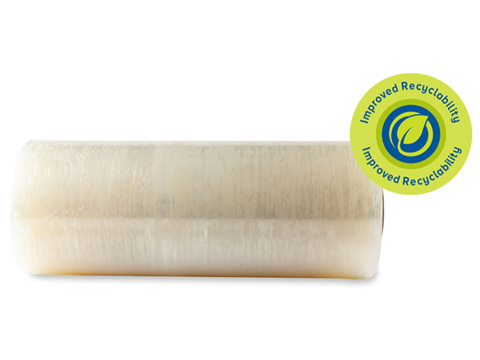
Berry Global has released an upgraded version of its Omni Xtra polyethylene cling film for fresh food products, intended as a certified recyclable alternative to traditional PVC solutions.
Previously, Omni Xtra was designed to package fruit and vegetables, meat and poultry, and deli and bakery products. The Omni Xtra+ film updates the original design to improve impact resistance and elasticity, as well as provide uniform stretching behaviour.
Its mechanical properties have been improved to allow for the production of a thinner overall film than PVC versions. At the same time, it is said to maintain strength and puncture resistance.
Compared to conventional PE films, it strives for higher clarity to match that of PVC, with anti-fog and condensation properties ensuring that the product remains visible on the shelf. ‘Excellent’ machinability and high elastic retention have been implemented for strong sealing properties, while its ease of handling is set to streamline throughputs on automatic packaging machinery.
Omni Xtra+ is said to be recyclable in line with European guidelines, with RecyClass and Interseroh providing certification of recyclability. Berry also states that the film complies with the proposed features of the EU Packaging and Packaging Waste Regulation and Extended Producer Responsibility.
It also claims to offer an overall weight reduction of over 25% in density compared to PVC – which, alongside its recyclability, contributes to Berry’s sustainability goals and BMore Together initiative. The company is a signatory of the Ellen MacArthur Foundation’s Global Commitment and hopes that its new film will meet the coalition’s shared targets.
Benjamin Hendriks, R&D manager at Berry Global Flexible Films, stated: “Our Omni Xtra+ film represents a significant technical advance over previous versions, mirroring the performance of PVC in terms of usability and clarity whilst lowering packaging weights for improved yields.
“In addition, its enhanced performance and presentation provide customers with effective product protection and maximum on-shelf appeal while meeting consumer demands for more sustainable pack formats and helping companies achieve their own sustainability goals, particularly by avoiding hard to recycle PVC films.”
In a similar development, SÜDPACK unveiled its new Multifol Extreme base film in December. Designed to package fish products, it is expected to offer thinner and more lightweight thermoforming packaging in vacuum and MAP applications, as well as cut down on costs and emissions across the value chain.
Meanwhile, YUTOECO seeks to forego plastics altogether with a transparent, plant-based film made from cellulose substrate. It expects to increase both visibility and environmental sustainability in a range of moulded fibre packaging applications.
If you liked this article, you might also enjoy:
The L’Oréal approach to packaging sustainability
The way we talk about plastic needs to change – here’s how to get it right
What steps is Apple taking to make its packaging more sustainable?














No comments yet